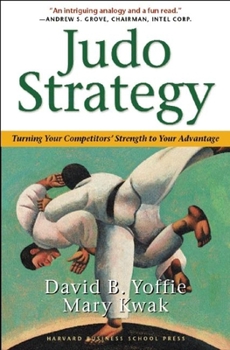Judo Strategy: Turning Your Competitors' Strength to Your Advantage
Select Format
Select Condition 
Book Overview
A century-old strategy holds the secret to toppling corporate giants. 'In a world where advantage increasingly depends upon movement rather than position, Judo Strategy drills home the ultimate principle of strategy: maximize impact while minimizing effort. This is easy to say but difficult to accomplish. The authors provide pragmatic techniques and examples to help make this principle come alive. Don't enter the market without this book' - John Hagel,...
Format:Hardcover
Language:English
ISBN:1578512530
ISBN13:9781578512539
Release Date:September 2001
Publisher:Harvard Business Review Press
Length:256 Pages
Weight:0.80 lbs.
Dimensions:0.9" x 6.4" x 9.5"
Customer Reviews
4 ratings
Your rivals can be toppled by their own commitments
Published by Thriftbooks.com User , 22 years ago
Yoffie & Kwak have written a terrific practical guide to winning a competitive battle against a business rival. I have used their ideas on numerous occasions in the past few months with my own strategy consulting clients and have highly recommended this book to them as well. I enjoyed the clear well-written insights from my first reading, but I am now drawn back to write this review months later as I have come to realize the general applicability of these concepts and the value I've gained from them.On reflection, I believe the strength of their book is the judicious use of the judo metaphor. Metaphors are powerful when they get us to see familiar opportunities or threats in new ways. That is exactly what this book did for me. Moreover, the judo metaphor helped me to remember easily all the nuances of their three core principles--movement, balance, and leverage--so that I could apply them to the business situations I deal with in my everyday life. This book describes a competitive insight supported by an apt metaphor--not a metaphor accompanied by numerous business examples.Yoffie & Kwak describe a battle plan for stealing advantage from the dominant player in an industry. Their advice for winning is not to be better, but to be smarter. I think their principles apply in any situation where the market leader has made explicit, valuable, often irreversible, commitments to the market place--to its customers, to its suppliers, to its employees, or to its alliance partners--in order to achieve its position. The strength of the leader's market position derives from these commitments. The authors recommend that we study these commitments and then use them against our rivals in order to gain competitive advantage for ourselves. The book guides one through numerous techniques for doing exactly this.Even though their examples are largely high-tech companies, this principle is as applicable to the steel industry as it is to biotech. I appreciated, though, their numerous applications of the often very clever techniques used by the high-tech companies cited in the book. Once I saw how the principles worked in these more challenging, and sometimes, more subtle situations, I was able to extend the principles myself to other industries and to make them part of my own strategy toolkit.Judo Strategy is one of the best strategy books I've read in the past year.
Even Bill Gates could learn a trick or two
Published by Thriftbooks.com User , 22 years ago
This is a great book for anyone competing with the 800 pound gorilla of their industry. It gave me a lot of ideas about how to look beyond other companies' strengths and take advantage of their weaknesses. The examples are inspiring (especially the examples of moves to avoid, like getting into a war of attrition). If you work anywhere other than Microsoft, you should definitely read this book.
Competing with Industry Giants ... and Winning
Published by Thriftbooks.com User , 22 years ago
Okay, I'm biased about this book. After all, our story (the Palm story) is well profiled in it! But I do believe that Yoffie and Kwak have captured and articulated well some of the essential elements of our strategy. Judo Strategy gives solid advice, and is loaded with examples, for those entrepreneurs who dare to compete against industry giants. Refreshingly, it also instructs you on what NOT to do, which is sometimes even more important. I recommend this book for anybody who choses to compete with market leaders.
An Important Reference Volume for Entrepreneurs
Published by Thriftbooks.com User , 22 years ago
To understand strategy we study the details of campaigns, what worked and why. You can fill a library with good books on military affairs, but if you want to think about business strategy there are relatively few that combine reliable history with analysis. Most business strategy books are either simple exhortations to do better or rigid formulas that would have brought tears to Clausewitz's eyes. Many business histories, on the other hand, offer little more than a dry recital of events. Judo Strategy is different. This is good analytic history, blending individual perspectives with overall strategy issues. Yoffie and Kwak bring in the personal dimension, while not losing sight of what it really takes to win. They present numerous detailed accounts of how entrepreneurs built (and in some cases then damaged) some of the country's best-known companies. Judo Strategy provides both an entertaining read and an important reference volume for entrepreneurs.Napoleon is quoted as saying: "Read and reread the campaigns of Alexander, Hannibal, Ceasar, Gustavus Adolphus, Turenne, Eugène, and Frederick; take them for your model, that is the only way of becoming a great captain, to obtain the secrets of the art of war." Following this logic, we should read and reread the campaigns of companies like eBay, Palm Computing, Sony, and Charles Schwab. Start with Judo Strategy.




